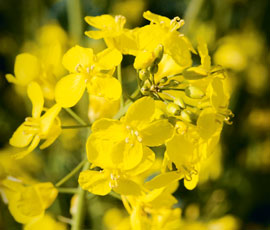Even sickly OSR can offer good returns

Current rapeseed prices are firm enough to offer growers a decent reward if they decide to stay with sickly autumn drilled crops rather than ploughing them up.
With new crop rapeseed trading at around £350/t ex-farm for July, traders says this can offer a good return even for crops that have struggled through the winter.
“We are telling our growers that £350/t plus a bonus for oil content represents a good gross margin for them,” says Jonathan Lane, trading manager at Gleadell.
With an oil bonus, this could push the price up to £370-380/t, not that far from the current spot price ex-farm of around £385/t.
Mr Lane expects the UK rapeseed crop to fall as low as 1.7m tonnes this year, from a 2012 harvest crop of more than 2.5m tonnes, due largely to poor autumn drillings.
Although the UK is set for a shortfall this season, better-looking crops in France and Germany are expected to more than compensate across Europe, traders say.
Owen Cligg, trading manager at United Oilseed, is not as pessimistic on the UK rapeseed crop putting it between 2m tonnes and 2.3m tonnes, but again says current prices look attractive for farmers.
“Rapeseed seems a good bet at the moment. Conditions are volatile, but £350/t looks a good price,” he says.
The autumn oilseed rape crop is estimated to have dropped 10% from a record high of 744,000ha in 2012 (see graph) and another fifth in the ground is of questionable viability, according to a recent ADAS survey.
This shortfall of around 70,000ha in autumn-drilled crops is set to rise as some very poor crops may have to be ploughed up while an upsurge in spring oilseed rape is unlikely to make up the difference.
Traders estimate lower-yielding spring crops could jump to around 55,000ha from last year’s 12,000ha, but will still be a relatively small part of the national rapeseed crop.
They point out that oilseed rape crops are notoriously difficult to assess for yield at this stage and the crop has remarkable powers of recovery.
Some poor pigeon-grazed crops with heavy weed infestations may need to be ploughed up, but traders cautioned farmers against making quick decisions.
Many agronomists urge growers to wait until warmer weather next month before making a final decision due to the shortage of seed for any spring-sown options to replace poor oilseed rape crops.
“It’s difficult to get hold of seed, whether it be spring oilseed rape or spring barley, so we would urge farmers to be cautious before ploughing in their crops,” says one trader.
Rapeseed is still a very valuable commodity and it would have to be a very poor crop to abandon it and still reap a reward by starting again with a fresh crop.
Think hard before ploughing in oilseed rape crops

